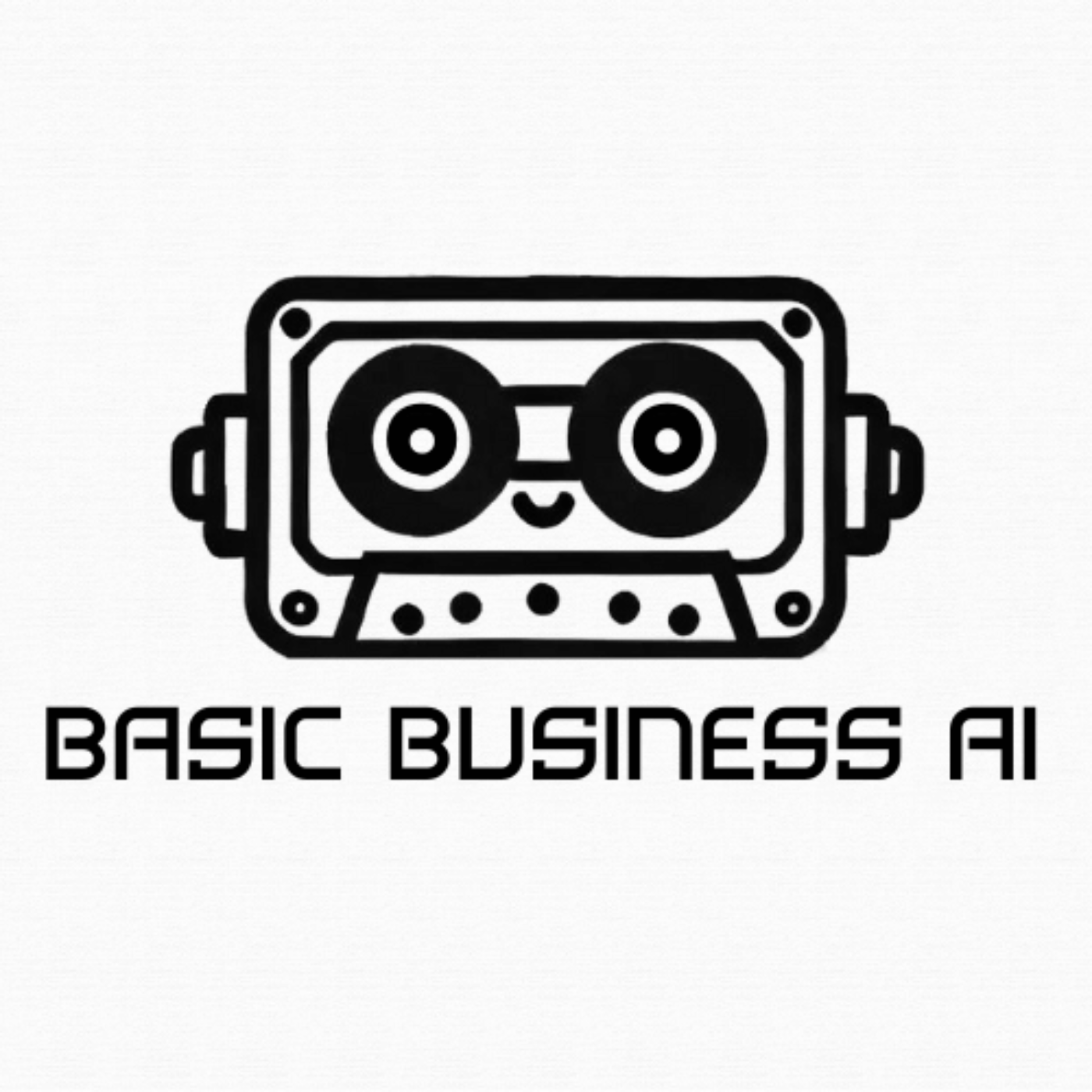[00:00:00] Speaker A: Welcome to Basic Business AI, a podcast dedicated to simple AI strategies for businesses who don't want to get an advanced degree or hire some marketing bro. I'm your host Ana Gonzalez and you can find me on social media at annabotprime. We bring on regular business owners like you and me to discuss practical strategies, ideas and perspectives about AI without getting too far into the weeds of the tech. BBAI is sponsored by Conversational Funnels. The easiest way to get more sales is to get more chances to sell. We use one simple conversational funnel to casually book 121 qualified sales opportunities in less than two weeks. In a brand new market where we had zero presence and zero connections, all without spending on ads, doing co outreach or posting endlessly on social media. This is the new way to close high ticket clients for 2025 and it only takes minutes to start booking calls. Download the blueprint for
[email protected] Today's guest is Jeff Grimfield. Jeff is an entrepreneur, advisor and disruptor with three decades of strategy, growth and marketing leadership. Jeff is currently building the next generation of AI driven attribution as the co founder and CEO of Prolytics, which is a cookieless attribution and measurement solution which enables marketers to prove the impact from upper on channels like CTV and grow their budget. So Jeff, welcome to Basic Business AI. From your perspective, how is AI reshaping the future of your industry?
[00:01:37] Speaker B: Well first off Anna, thank you so much for having me here today. And AI is definitely reshaping my industry. I live in the marketing world both on looking at what marketers are spending dollars on and on the measurement side of things. So in terms of how it is impacting the marketing side of things, we're starting to see a lot more automation that takes place and a lot of business owners have probably seen that when they log in to upload their ads. A lot of times what we're starting to see now, both in Meta and Google and even in some other platforms, it's like hey, just put in the URL of your website and we will create an ad automatically for you. And where that that's kind of the beginning stages and where that is eventually headed because since all of advertising is personalized, meaning that what you see in your feed is completely different than what someone else sitting right next to you sees. There is the capacity where the ads that you see are unique for you versus someone sitting right next to you. So the idea behind this is that you give an AI engine all of the elements of your business Your logo, the colors, your call to action, maybe some specials that you're running. And then what it will do is go out and it will create ads in real time for every individual. With the idea being that, you know, someone like a meta or Google, they kind of know Anna, what you're interested in. So maybe they know that this, even though we've said our color is blue, maybe a little bit of a different shade of blue may capture your attention more. So there's that capacity to really juice up the effectiveness of ads and the creative now that's great for local business and small to medium sized businesses. A lot of the larger brands that we serve, they're kind of shying away from that because we have these brand controls that are in place. So for a lot of the larger industries on the marketing side, they're kind of moving forward the way of how they've always done business. But for local smaller businesses, this is a huge advantage. On the measurement side, where we determine what's working and what's not working, we've had a lot of setbacks over the last couple of years because we used to measure things at an individual level and because of privacy laws and concerns, we've kind of moved up, if you will, up the funnel to where we're now looking at things in aggregate. So it's not just an individual, it's aggregated data. And that's where AI is great because what it's able to do for us is able to actually complete the picture. So we're able to get to the same types of answers we were able to get to five, 10 years ago with all of that user level data, without that data where the AI can complete the picture for us. So that's really remarkable. So it's changed a lot. So I'd say in two ways. One is that level of personalization because the engine knows you and eventually the ability to create these ads in real time. And then on the measurement side, it's able to complete the picture for us even though we can't actually see all the way through. And that's what's really incredible.
[00:04:45] Speaker A: It's amazing, Jeff, how, I mean we used to, it used to take long, so much longer to be able to know your avatar and now it's not just know your avatar as a mass with what you're describing is know your avatar as an individual, right? With that like with those kinds of measurements and those kinds like of, of know that person, an individual. On the other side, it, it taps into human psychology, you know, because we all, it's, it's natural for humans to want to be known and, and heard and seen. And with all this little knowledge of. I know that baby blue is not your favorite color, but like two shades to the right, like you were saying, will grab your attention. That's, that's impressive.
[00:05:40] Speaker B: It, it is. And you really tap onto something really important there, Anna, that has to do with marketing. And it's the emotional, psychological component of it. And one of the things that I think as marketers we've kind of not done a great job at is really understanding that. And there's, there's tons of research on this. Like the idea being that soda companies, when they advertise in dramas, they don't sell as much soda as they do when they advertise in comedies. So there's something about the emotional state that someone is in when they're consuming entertainment or when they're scrolling through their feed that your ad needs to align with that. And when you think about the numbers of people that are scrolling through a feed and that ad is just there, it's a piece of content, it's only there for a second. But meta, Facebook, they know who you are. They have all the details on you. They won't share it with us, they won't share it with the advertiser, but they know. And their job is to. The more effective the ads are, the more advertisers will come, the more money they'll spend, the more they can charge for the ads.
And when you start to think about, okay, well, Facebook understands all the stuff I like. They understand the articles I consume, they know the pictures that I like, and they know everything about me. They know the people that I'm connected to. So they have actually a really good psychological profile. And that's so different than how we used to do marketing years ago. Marketing years ago, we would create like a Persona. We're selling this product to a 30 year old woman who's single, lives in New York City, she has a dog, she's engaged. You know, we have all these, she has this type of job, she makes this kind of money. And maybe we'd have multiple Personas and we would build up essentially psychological profiles for those folks and build ads for those, you know, groups. But this can be done at scale with AI inside of the individual platforms, which is really amazing. On the measurement side, it gets a little bit more difficult because the whole idea behind advertising, there's this old saying which is half the money I spend in advertising is wasted. The only problem is I don't know which half. And that's always been the big issue for local businesses. If you're advertising just on Facebook, it's not an issue. You can 100% trust Facebook. It becomes an issue when you're spending on Facebook and you're spending on Google. Because now you have two sources of truth. You don't know who to trust. And let's say you decide, hey, I'm watching a lot of Hulu and there's a special for me running TV ads on Hulu and maybe YouTube. So now you've got regular Google, Facebook, Hulu and YouTube. Now it becomes very difficult to figure out what's working and what's not working. And that's where very sophisticated math and AI can come in to figure out. And, and even though we don't have that user level data, we can look at it in aggregate and figure out precisely that missing half, that half that's wasted. So you can redeploy that money and move it towards the things that are actually working. But if you're just on Facebook, go all in on Facebook, kill it there, because they will do an amazing job for you. And if you're selling to, if you're selling in the US and your market is anyone over the age of 40, Facebook and Instagram is really the place to be right now. Without a doubt.
Yeah.
[00:09:21] Speaker A: Facebook Newsroom is for all people like us.
[00:09:23] Speaker B: Yes, exactly. I didn't want to say that, but.
[00:09:27] Speaker A: You know, I did.
Well, maybe not you. It's for all people like me.
[00:09:35] Speaker B: There you go. Yes. Yes.
[00:09:38] Speaker A: That's amazing. So, Jeff, tell us about who you serve and how people can reach out to you.
[00:09:43] Speaker B: Yeah, we serve advertisers that are spending north of 5 million or more per year. That's where they tend to get the most roi. And, and just like a smaller advertiser, if they're spending 5 million a year just on Facebook, then they don't need us. Where they really need us is where they start spending on three to five different channels across a lot of different campaigns. That's, that's where that math gets really complicated. And that's where a platform like ours can help them to learn more about Prolytics. They can go to probalytics.com or they can connect with me on LinkedIn. I'll also just throw in a mention as well. We have a course that we put together because this whole world has changed a lot, not only because of AI, but also with all the privacy changes as well too. We put together an Attribution certification course. It's on our website. There's no cost for it. It's about an hour and a half. And afterwards there's a quiz. You pass the quiz, you get a Great certificate for LinkedIn. But what it does is it strengthens your foundation of understanding of what happened in the past, what's going on now. And once you have that better understanding, it really does a really good job of preparing you for what's going to come next. Because there's one thing that's always true about marketing and about AI is if things haven't changed since six months, another change is coming. There's always new change that's happening and so it's our job to always be prepared for that. And having a solid foundation will help you get there. And that's also
[email protected] awesome.
[00:11:17] Speaker A: I think that change have been changing just so quick that we just don't see it.
[00:11:23] Speaker B: That's right. That's right.
[00:11:25] Speaker A: So we're going to wrap from here. Thanks to our guest, Jeff Grimfield for joining us for a practical conversation about AI and its potential for business. You can learn more about what he does by visiting him on LinkedIn, Jeff Greenfield or going to probalytics.com make sure to get that free course. If you run a business of any size and you have some ideas or strategies around the topic of AI, we'd love to have you on a future episode as well. We interview business owners of all levels of experience, especially the 90% of us who are curious about AI but not trying to be the tech geniuses. Apply for our future episode by going to basicbusinessai.com and one more time, if you want to stuff your calendar with qualified and motivated ideal clients who want what you have, download the Conversational Funnels blueprint for free at Conversational Funnels. Com. See you next time on Basic Business AI. Oh, and by the way, if you like this episode, tell your friends. See you later.



